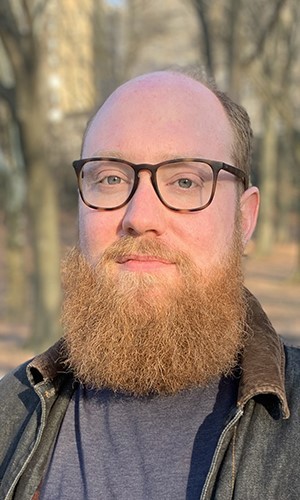Directing Thesis Interview: Indian Summer
Jacob Sexton directs Indian Summer by Gregory S. Moss. Below is an interview with Sexton about philosophies on directing, new work, and a glimpse at his own perspective on Indian Summer.

Why did you decide to do this particular production for your thesis project, and why are you excited about it?
Jacob Sexton [JS]: I identify as a new play director, and see the MFA thesis as an introduction to industry—so I wanted to stage a favorite new play by a playwright I adore, as an example of the kind of new work I aspire to create. Indian Summer is a beautiful play that deserves more productions and is a perfect vehicle for my thematic and aesthetic interests. The play feels close to home and the approach is deeply personalized.
You’re passionate about directing shows through an asexual lens. Can you talk more about that?
JS: I am passionate about directing, new plays in particular, and I am heteroromantic asexual spectrum—which is fundamental to my life experience and artistic perspective.
In grad school, I am exploring how romantic and sexual orientation relates to an artists’ creative work. I am passionate about art that wrestles with diverse perspectives of sexuality—all across the spectrum. And I am attracted to plays that explore the discovery and embodiment of identity, as well as plays that question assumptions about romance, connection, and intimacy. While my thematic interests are not exclusive to sexuality, it is frequent in my art.
My (a)sexuality is more relevant to some directing projects than others. But I very much look at Indian Summer through an ace lens.
As a playwright, asexuality is why I write—I’m interested in positive autofiction narratives and contemporary investigations of historical aces. Representation matters. At Columbia, I staged my own play Hurricane, an Ace RomCom about a restaurant that refuses to close on the evening of SuperStorm Sandy. In a collaboration course, I led a music-theatre investigation of Emily Bronte’s asexuality and its relationship to Wuthering Heights. And I am currently writing an ace play about George Bernard Shaw.
What draws you to new play development?
JS: I find new work thrilling—to champion new ideas and new voices, to help a playwright develop and realize their artistic intention, and to watch a play grow, often in unexpected ways, through a collaborative process. When directing a new play I am not just staging a production, but I am dramaturgically shaping the play itself.
I love theatrical art that is in conversation with the present moment. I realized in undergrad I was most excited by new work, so I interned at Actors Theatre of Louisville because of their Humana Festival of New American Plays. Artistic Director Les Waters inspired me to pursue a career centered on championing playwrights and Literary Director Amy Wegener taught me how to read and respond to new writing.
As a director, I believe that giving the microphone to artists I deeply respect defines my own voice; it’s a curatorial perspective—that the amplification of their voices, in conversation with one another, channeled through me, communicates my aesthetic and thematic passions. Theatre is fundamentally an interpersonal and collaborative art form.
What is the most exciting part about this project?
JS: The play has an ace protagonist. That’s my reading. Daniel does not express or act on sexual desire. He is experiencing a romantic connection and he is struggling to communicate his interest. Inside of a RomCom. That is a narrative that excites me—and feels personal—wrestling with a form that erases asexuality.
And I’m excited to be in conversation with Greg Moss! I’ve been a fan for a decade.
What do you anticipate will be your biggest challenge?
JS: ...the playwright not being in the room. This is still a new play project of course but not a world premiere- it’s a different process and energy when it’s not the first production with rewrites.
It occurs to me that although I staged great contemporary plays in undergrad—by Young Jean Lee, Will Eno, Martin McDonough—I haven’t directed a published play since 2012: my undergrad thesis of Beckett’s Waiting for Godot.
Tell us one of the biggest lessons you have learned during your time at Columbia?
JS: Everyone is inherently unique so the goal is to know and be your honest self.
Being in a cohort of six directors from all over the world I was amazed that when we presented the same scenes, we never overlapped in choices. Never. So the training is a pursuit of one’s own self-development of intuition, taste, aesthetic, and intention.
Tell us something that you found surprising about the process of putting up this production?
JS: How exhausting it is to direct four full lengths in less than a year! But also: how lucky to direct four full lengths—especially during a pandemic.
Do you have a philosophy for directing?
JS: Center the play. Assume it is correct. Wrestle with Respect. And be ready to recalibrate.
Directing is inspiring a group of artistic geniuses toward shared goals. I lead with enthusiasm and communal dramaturgy. Taste is subjective and intuitive. I prioritize collaborators over individual projects. I look for artists with shared thematic and aesthetic goals.
Where do you see yourself in five years?
JS: I am eager to find an artistic home. I have known since I was in high school that I am interested in artistic leadership—my first mentor was an Artistic Director and I have always thought of directing and leadership as symbiotic. I hope that in five years I will be working in an artistic office of a regional or off-Broadway company, with a focus on developing and staging new work. I want to fully commit myself to a theatre, and be in dialogue with the community in which I live. I am also interested in teaching and directing in academic environments. And someday I may start my own company. But the dream for post-MFA is to be an Associate Artistic Director and to freelance.

About the Artist, Jacob Sexton (he/him) is a director and playwright of new and experimental plays, with an interest in interdisciplinary collaborations. He is currently an MFA candidate at Columbia University, where he recently staged Evie Mason's Echo, In a Diner, Tré Calhoun's If You Like Me at My Worst, and his own full-length Hurricane (video links available upon request). Jacob has directed new plays at Actors Theatre of Louisville, La MaMa E.T.C., Ensemble Studio Theatre / Youngblood, Primary Stages MFA, the Brick, the Tank, and the Arkansas New Play Festival at TheatreSquared; additional playwright collaborators have included Clarity Bian, Kari Barclay, Aidan Holmes Carr, Rick Ehrstin, Cory Finley, Gracie Gardner, Keiko Green, Fiona Gorry-Hines, David Jackson, Kate Dakota Kremer, Arika Larson, Kate Mickere, Edward Precht, Will Snider, Jay Stull, Blake Sugarman, and Kanika Vaish. Jacob has also assisted directors Anne Bogart, Les Waters, Leigh Silverman, Jon Jory, Mortiz von Stuelpnagel, and Lila Neugebauer, among others, and most recently Michael Mayer on Swept Away, a new musical inspired by and featuring the music and lyrics of the Avett Brothers with book by John Logan at the Berkeley Repertory Theatre. Former Workshop Assistant with Clubbed Thumb, including SuperLabs with Playwrights Horizons, and Directing Intern at Actors Theatre of Louisville. Upcoming: New plays by Evie Mason and Emily Garrison as well as Chekhov and Shakespeare projects at Columbia MFA, and a new site-specific holiday musical by Bandits on the Run at Little Island NYC (December 2022). BA: Fordham. www.jacobmsexton.com @basedonnothing